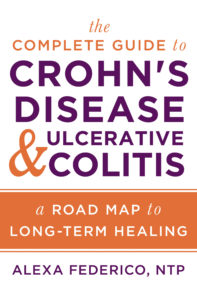Gastroenterologists had very little nutrition education (and you can assume it was not the most up-to-date information)
Medical school programs are not known for nutrition education. While the number of hours vary program-to-program, it is meek across the board. Just a few years ago my attending gastroenterologist candidly said he didn’t know enough about nutrition to advise his patients on it. I appreciated his honesty but was dismayed that even new doctors today are not getting nutrition education embedded in their training. I don’t expect this to change anytime soon but I WISH that patients would get referred to trained professionals like myself upon getting their diagnosis. Time is of the essence with autoimmunity, especially IBD where chronic inflammation can be very damaging to the bowels.
Your medical doctor is the expert in guiding you on allopathic medicine principles, so who do you lean on for holistic aspects of healing?
Some think because functional practitioners (unless they are naturopathic doctors) don’t do medication management or medical procedures that anyone can just Google their way through healing. I am a great proponent of research and self-advocacy, but I can say working with my dozens of clients, even the most well-researched and type A clients are missing things simply because they don’t have training that I have. As a functional nutritionist I can see things from a fresh perspective and can notice where there are gaps and potential problems in a client’s lifestyle, diet, blood work, etc. Within my three-month program, clients hit lots of their healing goals whereas it could take many more months or years to figure out what I have helped them through.
They have the time to give you
I spend 15 minutes with clients before they join my practice, 90 minutes at our first session, and 30 minutes for five follow-up sessions after that. Additionally, I am available by email and a messaging app to support and encourage or clarify questions along the way. Also, I spend lots of time sending thorough follow-up notes after each call and often do research or consult colleagues to help figure out answers to things I do not know. A lot goes into supporting my clients, which I hear from my clients is refreshing compared to the 15-20 minute consults they are getting in allopathic settings (and usually after a long time in the waiting room).
They view the body as a whole, not compartmentalized parts
If a client comes to me wanting to heal and improve IBD symptoms, but also has clear signs of an under-active thyroid or unbalanced blood sugar or sky high triglycerides, you BET I am keeping those in mind when making my client recommendations, and making sure my client is clear on what is going on and why we are doing what we are doing. Allopathic medicine is quick to view one bodily system alone and send you to specialist after specialist for various symptoms, without taking a moment to pause and look at how these may be connected. This is the functional approach in a nutshell!
They want to heal the root of the issue, not provide a temporary solution
The “functional” in functional nutrition alludes to “at the working level,” or how something functions at the very basic level. I aim to target why the body is out of balance and aim to bring it back into balance. While there are products that can ease symptoms, they are usually not healing what is causing the symptom, and that is what I aim to investigate. This ensures that the issue can be resolved or improved at a much better rate than simply covering it up.
Bonus…
This cannot be applied to all functional practitioners, but it does apply to me and that is, being in the IBD community myself, I understand it all. I understand the invisible illness, the medical gaslighting, the isolation, the every day challenges, the emotional burdens, etc. At least 9/10 clients mentions this as a strong reason for wanting to work with me. I can’t blame them. It is lonely and discouraging to move through a system that continues to say your issues are in your head or easily fixed with a pill. When things don’t work as they say, it makes you feel insane. But you my friend, are not.
Hey! Need a resource to determine what you should be eating in an IBD flare? How about that weird phase when you are half in, half out? Need to know what to eat when you are feeling AMAZING? My ebook, TThe Complete Guide to Eating for Crohn’s Disease & Ulcerative Colitis was made for you!






